China Arts & Entertainment
Op-Ed ⎪ Cyber Bullying and Fake News: What You Should Know About the Zhang Zhehan Story
Opinion: Zhang Zhehan is still being punished every day for a crime he never committed.
Published
4 years agoon
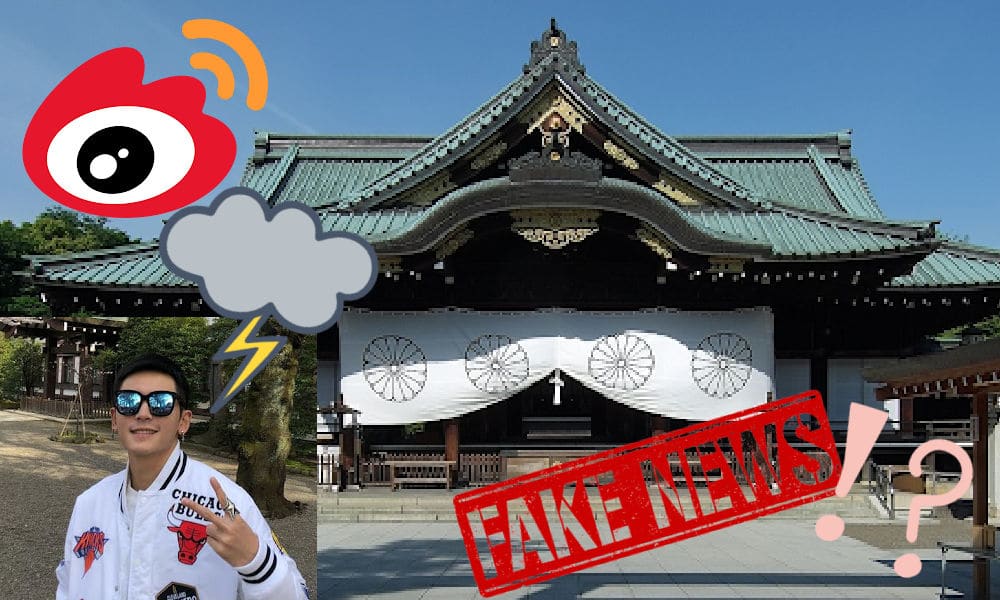
Along with several other celebrities, Chinese actor Zhang Zhehan has been a hot topic in the media this year ever since photos of him taken at the controversial Yasukuni Shrine went viral online. Not only does Zhang not deserve his recent blacklisted status, Jessica J. argues in this op-ed contribution for What’s on Weibo, he is also a victim of online fake news propagation and cyberbullying.
Those following Chinese entertainment news may have read about the string of celebrity crackdowns and cancellations this year, including big names like pop star Kris Wu, actress Zheng Shuang, and actor Zhang Zhehan.
However, Zhang Zhehan’s inclusion among Chinese ‘blacklisted artists‘ is raising some eyebrows and has also drawn the attention of Li Xuezheng, the Vice Chairman of the China TV Artists Association and Director of the Golden Shield Television Center.
Among those ‘canceled’ artists, Kris Wu was arrested on suspicion of rape, Zheng Shuang was fined for tax evasion – but Zhang Zhehan did not violate any laws and, according to Li, “was not officially banned or deemed immoral by government bodies” (Drama Panda).
Instead, Zhang was swiftly canceled when old vacation photos of him near the Yasukuni Shrine surfaced in August 2021, despite apologizing quickly for not knowing the significance of the buildings in the area.
[For context, read: Chinese Actor Zhang Zhehan Under Fire for Yasukuni and Nogi Shrine Photos – Ed.]

One of the photos featuring Zhang Zhehan, causing controversy in 2021.
After digging a little deeper, it becomes apparent that there is much more nuance to Zhang’s incident than can be captured in a single sentence such as “Zhang visited the controversial Yasukuni Shrine” or “Zhang posed for photos at the Yasukuni Shrine.”
Yasukuni Shrine is a Cherry Blossom Destination
The Yasukuni Shrine in Tokyo is notorious for enshrining “1,068 convicted war criminals, 14 of whom are A-Class (convicted of having been involved in the planning, preparation, initiation, or waging of the war).” The shrine is of great significance when it comes to Sino-Japanese history, as many of Japan’s war dead enshrined at Yasukuni committed atrocities against the Chinese, including during the ‘Nanjing Massacre‘ which started in December 1937 and came to be known as the most notorious Japanese atrocity of the Second Sino-Japanese War.
However, what many people think of as the Yasukuni Shrine only concerns the shrine’s religious structures, including the prayer and worship halls. These are the places where Japanese prime ministers go to pay respects to this day, resulting in recurring controversies.
The Honden Main Shrine, where nearly 2,5 million Japanese war dead are enshrined as ‘divinities,’ is usually inaccessible to the general public. No photography is allowed at the courtyard of the Haiden Main Hall, which is where people pay their respects.

Yasukuni Shrine Main Prayer Hall.
Outside of these structures, the Yasukuni Shrine grounds include an open park area famous for its cherry blossoms. In fact, it houses a “benchmark” cherry tree, which Japan’s Meteorological Agency uses to officially announce the start of the cherry season (NBC News). It’s important to note that Zhang’s photos were taken in this prime cherry blossom viewing area, and not inside the shrine itself.
When searching for “Yasukuni Shrine Cherry Blossoms” on Google, one will find many travel guides and blogs showcasing the lively atmosphere and the sea of people that come to visit during the blossom season. As recently as March 2021 (Phoenix News), Chinese media have included the area around the Yasukuni Shrine as a popular cherry blossom viewing destination. See examples from China Daily, People’s Daily, and China News. Chinese state broadcaster CCTV even covered the benchmark tree in March 2018, the same year that Zhang’s photos were taken.
Many articles that came out around August this year claimed that Zhang “posed in front of the Yasukuni Shrine” (see examples from Radii, Business of Fashion). This is false because the building in Zhang’s photo is actually labeled “斎馆” (Saikan) and is an administrative or office building on the park grounds.

The building behind Zhang Zhehan is actually an administrative building.
The cherry blossoms are clearly the main focus in all of Zhang’s photos. In 2018, there were over 31.19 million international tourists to Japan, including over 8 million Chinese visitors. Each year Japan attracts almost 3 million visitors during cherry blossom season alone.
Zhang was just one among thousands of Chinese tourists coming to view Japan’s famous cherry blossoms. If this is considered an act that hurts national sentiments, then what about the millions of other Chinese citizens that came for the same reason, not to mention the Chinese media that recommended this place as a tourist destination?
Signs of Coordinated Smear Campaign
The three-year-old photos of Zhang surfaced on August 13, a sensitive date leading up to the August 15th Victory over Japan Day, the day on which Imperial Japan surrendered in World War II.* In addition to the timing, other accusations against Zhang, including those around a wedding he attended in Japan, rest on blatant misinformation and falsified Baidu entries. (*The Chinese Victory over Japan is commemorated on September 3rd when the signing of the surrender document occurred. )
To a lesser extent than the cherry blossom photos, Zhang was also condemned for attending a friend’s wedding at the Nogi Shrine in 2019 and taking a photo with controversial figure Dewi Sukarno, one of the wives of the former Indonesian President Sukarno.
Netizens soon noticed that the Baidu entry for Nogi Shrine was created the night before on August 12. Similarly, Baidu entries for Mrs. Dewi and Nogi Maresuke, the general whom Nogi Shrine is named after, were both edited on early August 13.

Photos of Zhang at his friend’s wedding at the Nogi Shrine.
Chinese state media outlet Global Times wrote that “there were also photos of Zhang attending a wedding ceremony at Nogi Shrine, another infamous shrine that honors imperial Japanese military officers who invaded China during World War II.”
While it is true the Nogi Shrine honors Japanese general Nogi Maresuke, he died in 1912, well before the events of WWII. So where did this blatantly false information come from?
It is also worth noting that the popular Japanese idol group Nogizaka46, who held a coming-of-age ceremony at the Nogi Shrine, performed several concerts in China without issue.
Numerous other rumors, though not published by reputable media, circulated broadly on social media sites including international platforms such as Youtube and Twitter.
Almost all of them have been debunked as misinformation or complete fabrications. For example, Zhang starred in a short film titled Brother, where his character’s mentally challenged older brother raises his hand when he gets a nosebleed. Zhang took a series of photos interacting with his co-star, but the photo of this gesture was taken out of context to accuse Zhang of making Nazi gestures.

The middle image in the top row was used to accuse Zhang of making Nazi gestures. His comment is a quote from the show, and his co-star responded similarly.

The nosebleed gesture from Brother.
Netizens have also noticed that over 800 marketing accounts posted at almost the same time asking for Zhang’s works to be taken offline (Weibo search), and that so-called water armies (paid commenters) heavily manipulated the direction of social commentary and sentiments (a netizen’s data analysis).
Based on all of this information, it can be reasonably concluded that Zhang was the target of a coordinated smear campaign.
Consequences of Misinformation and Cyber Violence
Within a time span of less than a week, Zhang lost all sponsorship deals and his career suffered a massive blow.
Shows featuring Zhang, including Word of Honor and Demon Girl, were taken offline from Chinese platforms Youku and Le.com. His scenes were erased from the critically acclaimed Nirvana in Fire. His songs “Gu Meng” and “Tian Ya Ke” from Word of Honor could no longer be streamed on various platforms and variety shows featuring him either removed the episodes including Zhang, or he was simply blurred out.
In addition, Zhang faced mass silencing, erasure, and defamation on all Chinese social media platforms:
- Zhang’s accounts on all social media platforms were closed.
- His face still cannot be shown on Bilibili, Douban, and other platforms (videos featuring Zhang will be deleted).
- All positive content on Zhang has been deleted or has been made unsearchable on video site Bilibili. Searching for Zhang’s name on this platform will only show videos condemning him.
- Many netizens still refer to Zhang as a “traitor” or a “spy.”
- Before Li Xuezheng spoke up for Zhang, anyone attempting to clarify Zhang’s situation often found their posts deleted or their accounts closed.
- Li posted on December 5th that Zhang doesn’t even have the right to his own name: “There are only two people in the world who can’t buy things on the internet. One is notorious fascist Hitler, the other is our Zhang Zhehan.”
Since Zhang was included on the performers’ blacklist issued by the Chinese Association of Performing Arts (CAPA), Li Xuezheng has been investigating potential corruption within the industry-led organization. In doing so, Li Xuezheng is also providing a platform for Zhang and his family to speak out for the first time since they’ve been silenced.
Li recently posted a letter from Zhang’s mother, garnering over one million likes within a day. In the letter, Zhang’s mother described the harrowing experience her son and her family have gone through over the past few months.
She wrote:
“Not only have the dreams and achievements he [Zhang] has worked for for more than ten years been crushed, but the entire internet is also filled with one-sided rumors and slander. His positive actions, his love for the Party and the country are erased, and his works have all been de-platformed. My son told me that he did not enter the Yasukuni Shrine, he did not visit it, let alone pay any respects. The information spread on the internet is false… We never got a chance to clarify. We feel completely powerless and hopeless.”
This part, in particular, was difficult to read:
“The little nephew he loves is only four years old and dares not look at him, saying that his uncle is a bad person. When my son heard this, he went to his room and cried… He is really a strong person ordinarily, but at this moment he was broken.”
Zhang Zhehan was canceled in August over misinformation that cannot stand up to scrutiny, yet numerous reputable media entities continue to spread misinformation without further investigation.
As a consequence, Zhang’s works were de-platformed, his presence erased, his voice silenced, and even the right to use his own name is lost, all without any legal backing. In a country governed in accordance with law, a person should be considered innocent until proven guilty. But it’s been over four months now, and despite having committed no crime at all, Zhang is still being punished every day without rescission.
By Jessica J.
Jessica J. (alias) is the initiator of the Teddyfoxfluff blog which collects and translates Weibo posts relating to the Zhang Zhehan controversy. To read more, visit her blog here.
For more about Zhang Zhehan on What’s on Weibo, see our overview here.
Spotted a mistake or want to add something? Please let us know in comments below or email us.
©2021 Whatsonweibo. All rights reserved. Do not reproduce our content without permission – you can contact us at info@whatsonweibo.com.
Jessica Jones (alias) is a Chinese-American software engineer and Computer Science MA graduate with a love for Chinese dramas. In light of the 2021 news developments involving Chinese actor Zhang Zhehan, she started the Teddyfoxfluff blog.

China Arts & Entertainment
The Wong Kar-wai Scandal Explained: The Dark Side of ‘Blossoms Shanghai’
Whenever reports surfaced about the harsh conditions on Wong Kar-wai’s sets, mainstream media and fans often brushed off his tyrannical habits as the quirks of a genius. This time, it feels different.
Published
2 months agoon
October 3, 2025By
Ruixin Zhang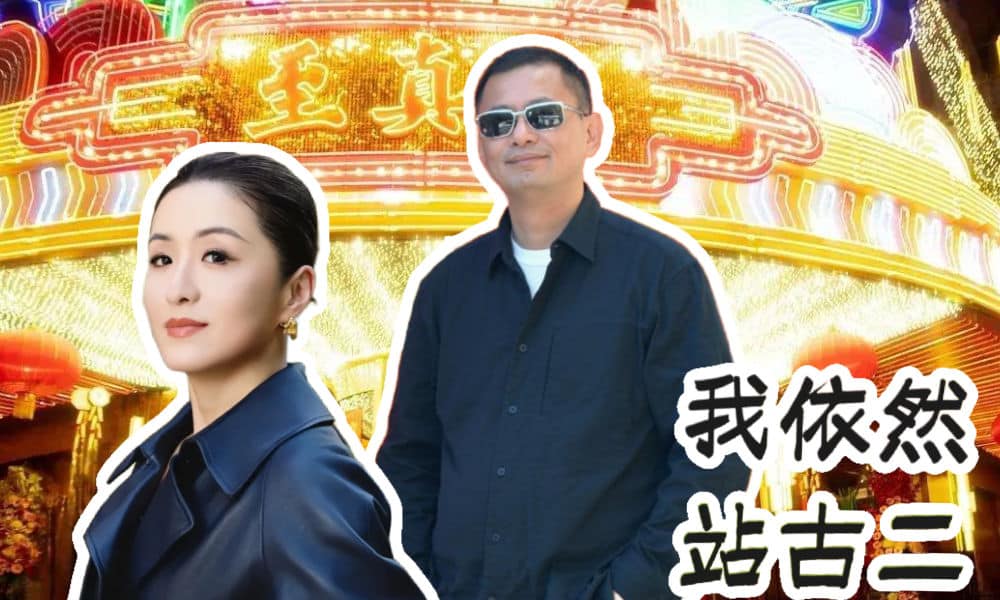
After renowned director Wong Kar-wai was accused of exploiting a young writer during the production of the hit TV drama Blossoms Shanghai, a scandal unfolded that may be one of the biggest stories in China’s entertainment industry this year.
Even if you don’t recognize him by face, you most likely know him by name: Wong Kar-wai (王家卫, 1958), the internationally acclaimed Hong Kong movie director.
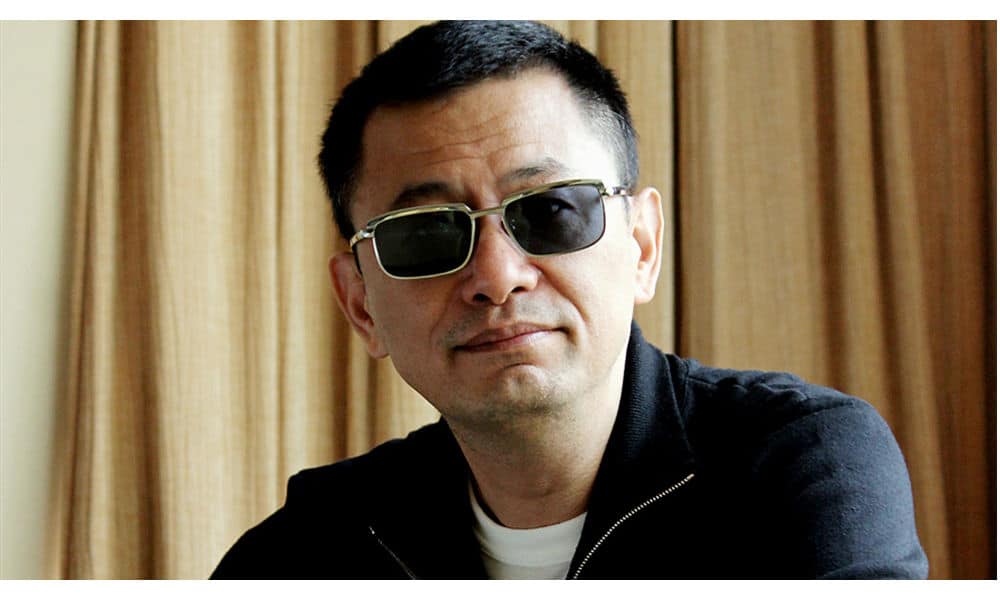
Director Wong Kar-wai, characteristically in sunglasses. (Image via Iazimao).
In late 2023, Wong Kar-wai released his first television series, Blossoms Shanghai (繁花), which was referred to a being the third part of an informal Wong Kar-wai trilogy that started with his films In the Mood for Love and 2046. Thanks to its superior production quality, star-studded cast, and Wong Kar-wai’s signature visual style, it became one of the most talked-about Chinese TV dramas of the time.

Scenes from Shanghai Blossom.
Adapted from Jin Yucheng’s award-winning novel, Blossoms Shanghai is set in 1990s Shanghai and tells the story of a young man, A Bao (played by Hu Ge 胡歌), who aspires to become a successful businessman and self-made millionaire during China’s booming reform era. The series contrasts the protagonist’s troubled past with the city’s vibrant present—and even sparked a wave of visitors to Shanghai landmarks featured in the show.
“Overnight, the headline “Wong Kar-wai Suspected of Exploiting Employees” became the biggest story in Chinese entertainment news”
However, in September, screenwriter Gu Er (古二,real name Cheng Junnian 程骏年) stirred controversy when he published a post on his WeChat official account, @GuErNewWords (古二新语), accusing Wong Kar-wai and lead writer Qin Wen (秦雯) of serious exploitation during the production of Blossoms Shanghai.
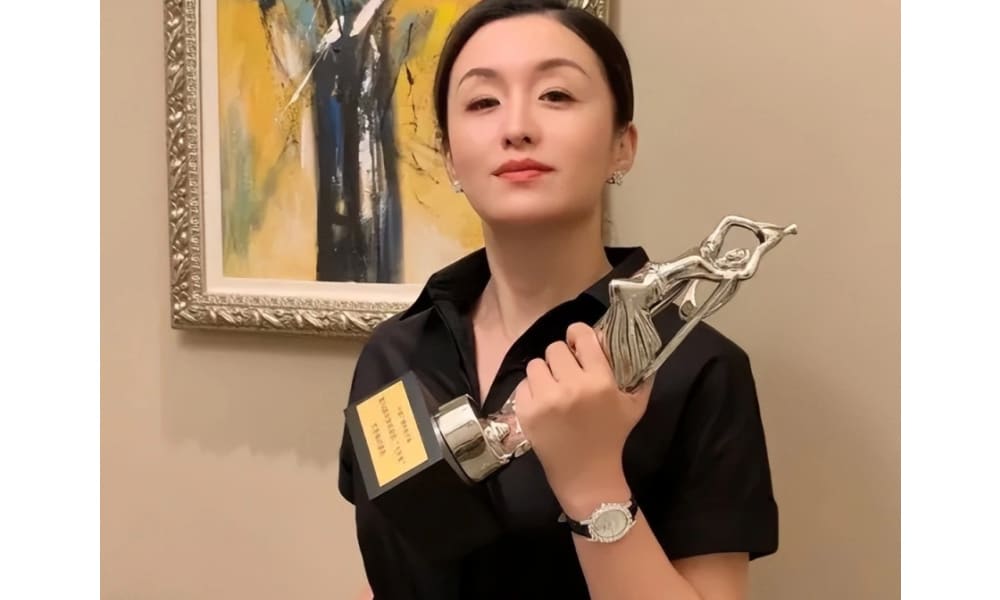
Qin Wen, image via Tencent News.
Overnight, the headline “Wong Kar-wai Suspected of Exploiting Employees” (王家卫《繁花》被爆疑似压榨员工) became the biggest story in Chinese entertainment news.
Gu Er is an experienced young screenwriter. After earning a master’s degree from the New York Film Academy, he returned to China, where he worked in theater and dabbled in online films. Though he never became a household name, he had carved out a modest presence in the entertainment industry.
According to a series of diaries he began sharing on WeChat in 2022, Gu Er first joined the Blossoms production team in 2019.

Example of Gu Er’s writings, where he talked about the difficult conditions of working on the Blossoms production.
He described the experience as “powered purely by love” (用爱发电)—in other words, long hours, meager pay, and sheer passion keeping him afloat. These early posts detailed many interactions with Wong Kar-wai and lead scriptwriter Qin Wen, but since the drama had not yet aired, his satirical, lightly veiled critiques attracted little attention.
“When the credits rolled, Gu Er’s name was nowhere to be found under the screenwriting slot”
In 2023, upon the premiere of the series, Gu Er published an article titled “The Truth Behind the Writing of Blossoms” (《繁花》剧本的创作真相). In it, he claimed to have written substantial portions of the storyline and character arcs—work that, he said, had been personally approved by Wong.
He also shared chat screenshots and presented several key concepts he had pitched, many of which viewers later recognized in the broadcast series.
Yet when the credits rolled, his name was nowhere to be found under the screenwriting slot. Instead, he was listed only as “preliminary editor” (前期责编), buried at the very end of the credits in a position so minor it was almost negligible.
For Gu Er, this was humiliating. He believed that his field research, character development, and story-building should have earned him recognition as at least one of the principal writers. The post sparked some discussion, but once again, the controversy quickly faded.

Cheng Junnian is Gu Er’s real name, and in the later recordings he posted, Wong Kar-wai also called him by his real name.
It wasn’t until September 16, 2025—nearly two years later—that Gu Er released another definitive essay, “My Experience as a Screenwriter for Blossoms: A Summary” (《我给〈繁花〉做编剧的经历——小结》).
This time, he laid bare every painstaking detail of his creative process for the main female character’s storyline. He claimed that the production refused to reimburse any of his research and interview expenses—not even for meals or books. He recalled one particular moment: “Once I spent 100 yuan [$7], and the Hong Kong producer immediately scolded me in public: ‘How does writing cost any money?’”
“It’s just a few thousand yuan; he is an assistant and can also write the script—it’s a bargain”
Besides writing duties, Gu Er said he also had to cook meals and run endless errands for Wong Kar-wai. In fact, Gu Er suffers from Kennedy’s disease, a motor neuron illness similar to ALS but slower in progression. Like ALS patients, he is gradually losing strength in his limbs. The intense, high-pressure work environment on set made his condition much worse. When he first told Wong Kar-wai about his health, Wong allegedly responded with nothing but suspicion: “What do you want from me?”

Gu Er, image from the time he was a guest chef at Dee Hsu’s reality show.
Wong Kar-wai wasn’t the only person Gu Er accused of exploitation. He also named lead screenwriter Qin Wen, one of the most prominent figures in Chinese television, known for hit dramas such as The First Half of My Life (我的前半生) and My Heroic Husband (赘婿). Qin is also credited as the screenwriter of Blossoms. According to Gu Er, once his draft script was handed to Qin Wen, she “made a few revisions,” and it was then presented as her work.
He further alleged that Qin tried to push him out of the production team, but Wong Kar-wai intervened, saying: “It’s just a few thousand yuan; he is an assistant and can also write the script—it’s a bargain.”
This post finally drew widespread attention. While the public was shocked by the alleged misconduct of a beloved director, many also questioned Gu Er’s credibility.
The Blossoms production team quickly issued a statement, asserting that more than 2,000 crew members had all been properly credited, and later clarified that Gu Er had only been part of the early-stage research team.
“The very type of boss you’d be too afraid to confront in your own workplace”
However, netizens began combing through Gu Er’s WeChat account and discovered that, in recent months, he had uploaded a series of audio recordings of conversations among the production staff—including Wong and Qin.
These recordings became crucial evidence in Gu Er’s defense. In one recording, a producer admitted that Qin had used ghostwriters and that several major plotlines had, in fact, been written by Gu Er. She also acknowledged that it would be difficult for him to receive proper credit.
Other tapes revealed the director’s harsh treatment of crew members; in one instance, Gu Er himself was publicly humiliated and accused of being “a dog using its master’s power” (狗仗人势).
On September 22, Gu Er released another recording. This time, it featured Wong Kar-wai and Qin Wen gossiping about several well-known actors; when the conversation ended, they asked Gu Er to serve them their food.
Having studied at Le Cordon Bleu in San Francisco, Gu Er had apparently been cooking for Wong without pay. Netizens were particularly angered by how arrogant and condescending Wong sounded in the recording, which many said reminded them of the very type of boss they had been too afraid to confront in their own workplaces.
At the same time, netizens dug up a 2024 report from Hong Kong’s Ming Pao (明报), which detailed how a female screenwriter’s script for Blossoms had also allegedly been exploited by Wong Kar-wai. That writer, too, reportedly suffered from depression as a result.
“The Gu Er incident is a snapshot of class solidification”
On September 23, Gu Er’s WeChat account was taken down, rendering all of his articles and audio recordings inaccessible.
Since both WeChat and the parent company of Blossoms’ production house, Tencent Pictures, are owned by Tencent, netizens immediately speculated that the platform had silenced Gu Er to contain the scandal. The move only fueled public suspicion that Wong had indeed exploited young writers—and calls grew louder for an official response from Wong Kar-wai.
As the controversy spread, screenwriter Qin Wen posted a denial on Weibo, insisting that she had been slandered.
Oscar-winning cinematographer Peter Pau (鲍德熹), who worked on Blossoms, also weighed in, saying that all responsibilities had been clearly outlined in the contracts and accusing Gu Er of deliberately stirring trouble. Hong Kong director Wong Jing (王晶) likewise voiced his support for Wong Kar-wai.
However, the broader public—the majority of netizens as well as many within the industry—stood by Gu Er.
The film news account Qiangbaoshan (@誓要抢包山) commented that regardless of the exact truth of Gu Er’s claims, it was already alarming and unjust that major figures in the film industry had banded together to discredit him while his own platform was banned.
Commenters on Xiaohongshu wrote thousands of posts in defense of Gu Er, calling the incident “a snapshot of class solidification,” or writing: “I also stand with Gu Er. Either you hire a proper chef, or you clearly define the work. If someone contributes ideas and creativity, then give them the pay and credit they deserve.”
Gu Er’s friend Ma Nong (玛侬) also published an article on her WeChat official account in his defense, sharing new photos of Gu Er at work and on set to prove that he had indeed played an important role in the Blossoms production.
Yet through it all, to this day, Wong Kar-wai himself has not uttered a single word in response.
“Because of his cinematic achievements, the media and fans often laughed off his tyrannical behavior as the eccentric quirks of a genius”
Some netizens, after learning the details, were puzzled by Gu Er’s behavior. They criticized him as weak and overly servile, suggesting that what he faced now was partly the result of his own personality flaws.
Yet this very dynamic may be why the public’s anger toward Wong Kar-wai ran so deep. Wong is arguably one of the most influential directors in Chinese cinema. Works such as In the Mood for Love, Chungking Express, and Happy Together have left an indelible mark on world cinema and inspired generations of filmmakers. For a relative ‘nobody’ like Gu Er, Wong Kar-wai would have seemed an idol—a god-like figure (Gu Er also expressed his love and admiration for Wong in his previous articles). And it may have been precisely this sense of awe and worship that left Gu Er vulnerable to workplace bullying and manipulation.
Wong Kar-wai’s harsh treatment of his actors and crew has actually never been a secret. Famous actors who previously worked with him, such as Leslie Cheung and Tony Leung, have spoken openly about his extreme working methods. After filming Happy Together, Leslie Cheung announced that he would never work with Wong again, later revealing that he felt the director had exploited his sexuality. During the shoot of Ashes of Time (东邪西毒), Cheung nearly died from poisoning in the desert. Even in their earlier collaborations, he was often tormented by Wong’s constant changes and endless demands.
Wong’s obsessive pursuit of his own has repeatedly come at the expense of those around him. While filming The Grandmaster, he reportedly withheld actress Song Hye-kyo’s passport and kept her on set for months, only to use a handful of shots in the final cut.
Yet, because of his cinematic achievements, the media and fans often laughed off his tyrannical behavior as the eccentric quirks of a genius.
After the Gu Er controversy, however, many began to re-examine the man behind the perpetual sunglasses—not as an untouchable auteur, but as an employer accountable for his power. Wong Kar-wai has long been known for procrastination, perfectionism, and “torturing actors,” but the stakes of this reputation now feel different.
Meanwhile, Gu Er’s WeChat account remains banned. It is difficult to imagine why a man already battling a degenerative illness would continue to fight so publicly for recognition, unless he felt he had nothing left to lose.
Writer Shuimuding (水木丁) raised deeper concerns about Gu Er’s desperate, all-or-nothing stance, reminding readers of the darker history of the Chinese film industry, where young talent has been pushed to despair—and sometimes even to death—by powerful figures. The most haunting example is Hu Bo (胡波), the brilliant director of An Elephant Sitting Still (大象席地而坐), who took his own life after facing similar pressures.
This is why the Wong Kar-wai scandal matters. No matter how talented the director, actual exploitation can never be justified for the sake of the project. Perhaps it is time to stop using exceptional artistic talent as an excuse for unacceptable workplace dynamics.
By Ruixin Zhang
Independently covering digital China for over a decade. Like what we do? Support us and get the story behind the hashtag by subscribing:
edited for clarity by Manya Koetse
Spotted a mistake or want to add something? Please let us know in comments below or email us. First-time commenters, please be patient – we will have to manually approve your comment before it appears.
©2024 Whatsonweibo. All rights reserved. Do not reproduce our content without permission – you can contact us at info@whatsonweibo.com.
China Arts & Entertainment
Evil Unbound (731): How a Chinese Anti-Japanese War Film Backfired
731 was China’s most anticipated war movie of the year — how could it fail so miserably to live up to public expectations?
Published
2 months agoon
September 24, 2025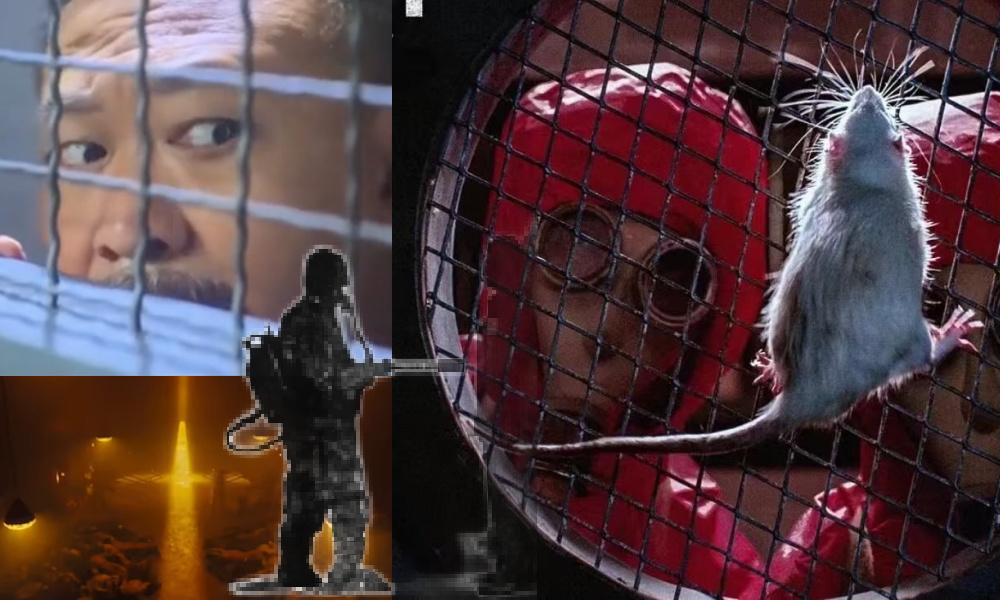
🔥 This is premium content and also appeared in the Weibo Watch newsletter. Subscribe to stay in the loop.
How did Evil Unbound (731), one of the most anticipated Chinese war movies of 2025, go from patriotic hype to online backlash? A deep dive into the official narrative, the audience reception, and everything that’s particular about this movie.
731 and 918, those were the numbers dominating Chinese social media over the past week. Both numbers carry heavy historical weight, but the recent discussions surrounding them reveal two parallel worlds of the official narrative vs the audience experience of a controversial new World War II film.
It was “9.18” on Thursday, when China commemorated the 94th anniversary of the September 18th Incident (九一八事变). On that day in 1931, a small explosion on a Japanese-owned railway near Shenyang (Mukden) was used as a pretext to invade Manchuria.
While many older Chinese were taught in school that the war began in 1937, recent state-led campaigns increasingly emphasize 1931 as the true beginning of China’s “14-year-long war” (1931–1945). Over the past decade, the 918 commemorations have become more prominent online, shaping public memory through nationalistic messaging.
This year, the commemoration had an extra dimension, as it wove the release of Evil Unbound (English title), also known as 731, into the patriotic media narratives around 918.
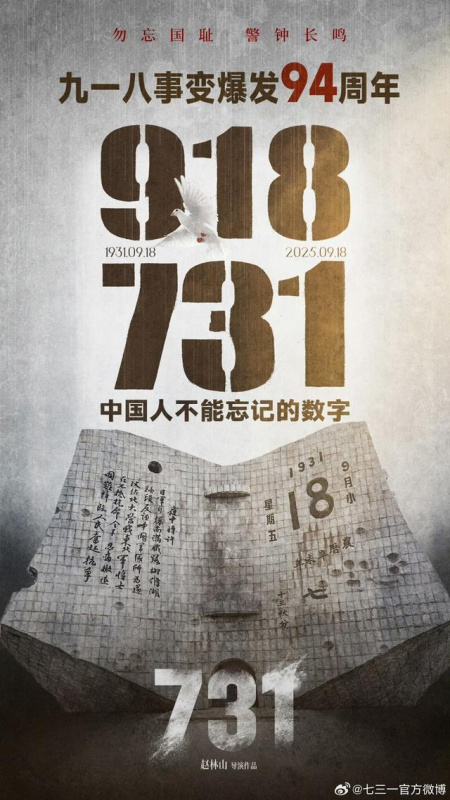
Patriotic film poster putting 918 and 731 together.
The much-anticipated war movie 731 depicts the atrocities of Japan’s Unit 731 (731部队), notorious for conducting horrific biological warfare experiments in Harbin during World War II under Major General Shiro Ishii (石井四郎), a former army surgeon and biologist with a particular interest in historical plagues. Under his command, Japan’s biological warfare and human experimentation in China were carried out on a larger scale than anywhere else between the 1930s and 1940s.
After the war, because the US felt his knowledge on bioweapons was of great value, Ishii was granted political immunity deal and was never brought to trial.
Together with the Nanjing Massacre, Unit 731 has come to symbolize the peak horrors of Japan’s wartime atrocities. Public attention for this history has grown in recent years, especially since the 2015 opening of the Harbin-based Museum of Evidence of War Crimes by Unit 731.
It was around that same time, about a decade ago, when Chinese director Zhao Linshan (赵林山) started working on the movie Evil Unbound (731), produced by Changchun Film Group in collaboration with the Propaganda Departments of Shandong, Jilin, Heilongjiang, and Harbin.
It finally premiered nationwide on Thursday, ‘9.18’ at exactly 9:18 and shattered 10 box office records on its opening day. Screened 258,000 times in a single day, it rapidly surpassed 200 million yuan (US$28 million) in ticket sales. After three days, the box office exceeded 1 billion yuan (US$140 million).
The film focuses on Unit 731 in the final days before Japan’s defeat in 1945, portraying how local salesman Wang Yongzhang (王永章, played by Jiang Wu 姜武) is imprisoned together with other civilians. They are promised freedom in exchange for “health checks and epidemic prevention cooperation,” and are subjected to frostbite experiments, poison gas, and vivisections.
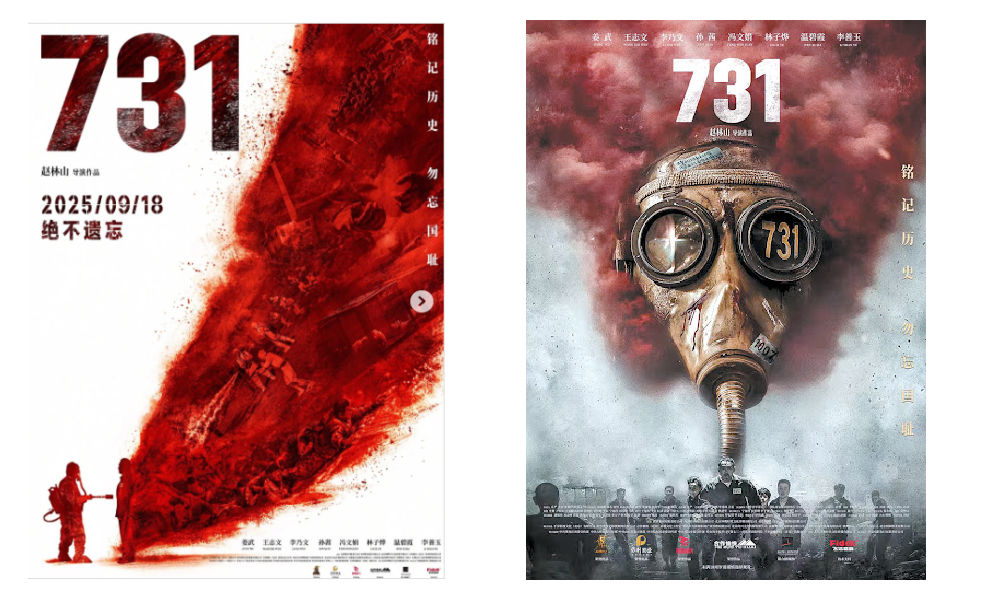
Official film posters for Evil Unbound/731.
“What we made is not a movie — it is historical evidence,” director Zhao said about the film.
A state-orchestrated hashtag ecosystem is currently amplifying the film’s ‘success.’ Similar to previous viral war film hits such as The Battle at Lake Changjin (长津湖) and Nanjing Photo Studio (Dead to Rights 南京照相馆), the media campaigns highlight the film’s commercial performance, its educational and historical value, the ‘authenticity’ of its production process, and its emotional reception and overseas recognition.
Recent trending hashtags, from Kuaishou to Weibo and beyond, include:
- 电影731票房再创新高 – “Film 731 sets another box office record”
- 没有人能在看731时不流泪 – “No one can watch 731 without crying”
- 观众掩面哭泣 / 哭到没法接受采访 – “Audiences cover faces in tears” or “Audiences too moved to be interviewed”
- 观众自发起立唱国歌 – “Audience spontaneously stand up to sing national anthem”
- 海外观众看731不停抹泪 – “Overseas audiences weeping when seeing 731”
- 9岁小孩看完731后泪奔 – “9-year-old child burst into tears after watching 731”
- 日本观众看完电影731后情绪崩溃 – “Japanese audiences having emotional breakdown after watching 731”
- 让731这段历史不再沉默 – “The history of 731 can no longer be silenced”
There are hundreds of other hashtags contributing to this official narrative, that portrays Evil Unbound as an absolute patriotic and commercial triumph.
From Anticipation to Backlash: 731 Between Shawshank and Squid Game
Outside of this official narrative, however, audiences are telling a very different story. Despite months of anticipation, the film has been met with overwhelmingly negative reviews.
On Weibo, the hashtag “731 Film Review” (#731影评#) was pulled offline. On Douban, the movie’s ratings meter was switched off entirely (“暂无评分”). On IMDb, the film is currently rated 3.1.
Usually, criticism of patriotic films is a slippery slope. People have been censored, blocked, or even detained for criticizing war films. But criticism of this film is so widespread, and so ubiquitous across social media platforms, that it is barely containable.
Many viewers called the movie “trash,” while others said they felt “defrauded”.[1] One commenter suggested the director tried to make The Shawshank Redemption but ended up with Squid Game.[2] Others called it “bizarre”[3], or concluded: “The short review section doesn’t even allow enough characters to describe how unbearable this movie is.”[4]
Viewing the film, I must admit I also felt confused – the movie is nothing like you would expect after the state-led promotion of the film.
The opening minutes quickly set a messy historical context, leaping from the 1925 Geneva Protocol to China’s 1943 counteroffensives, to Iwo Jima, and to Japan’s “Operation PX” plan (Operation Cherry Blossoms at Night), a scheme to attack the United States with biological weapons—before landing in Harbin and Unit 731 in the year 1945.
About ten minutes in, the movie seems to switch tracks and take inspiration from Squid Game, the 2021 South Korean survival drama.
Some details appear almost one-to-one from the Netflix show: the cold speaker voice, characters labeled by numbers, stylized lighting (including the Japanese flag’s red dot turned into menacing red spotlight), and eerily sterile sets that create a cold, clinical atmosphere stripped of humanity.
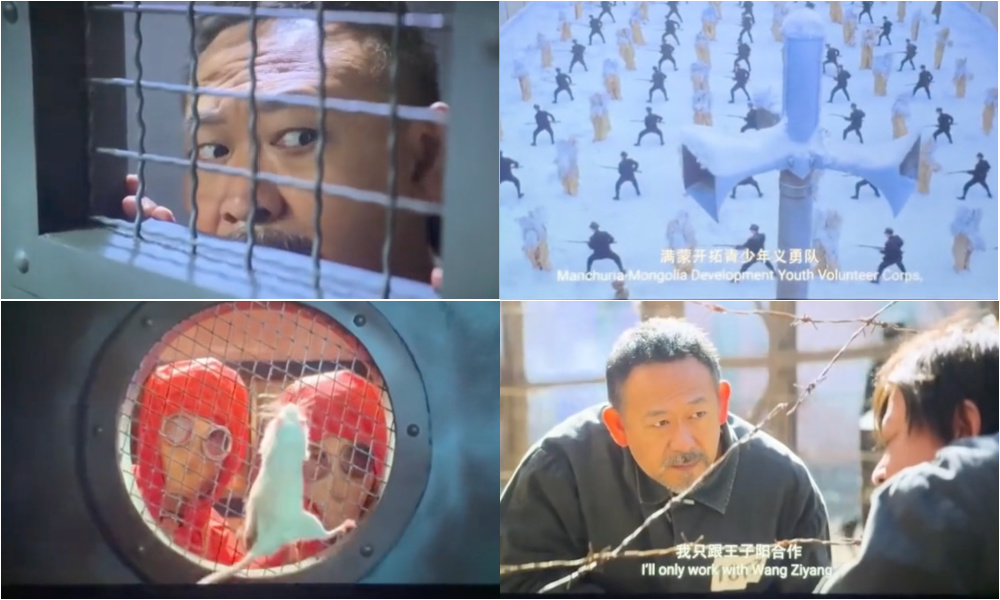
Scenes from 731.
Narrative elements also echo Squid Game’s deadly competitions, including an actual life-or-death rope pulling game. In 731, “winners” are promised freedom (but actually sent for experiments) and “losers” surviving slightly longer, until even these rules seemingly disappear, leaving viewers just as lost as the characters.
Beyond these echoes of Squid Game and The Shawshank Redemption (with their themes of prison break, brotherhood, and hope), where horror meets drama and occasionally even comedy, I also thought I saw traces of The Green Mile (there’s even a befriended mouse), The Shining, One Flew Over the Cuckoo’s Nest, and even Kill Bill.
If this all sounds like a fever dream, that’s about right.
While the film undoubtedly has artistic value in its visual references and symbolism, at times it seems more intent on presenting itself as an arthouse production than on telling a coherent historical war story.
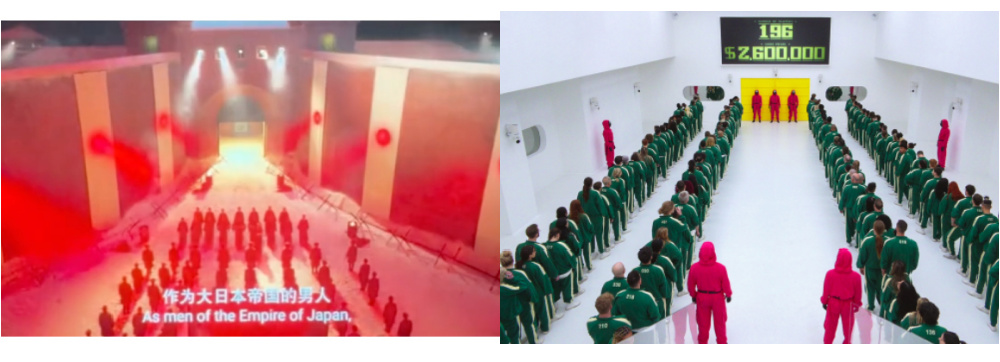
731 scene showing Japanese flags with red lasers/spotlights one the left. Some of the movie’s camera angle points, color use, narrative elements and settings show some similarities with Squid Game (image on right).
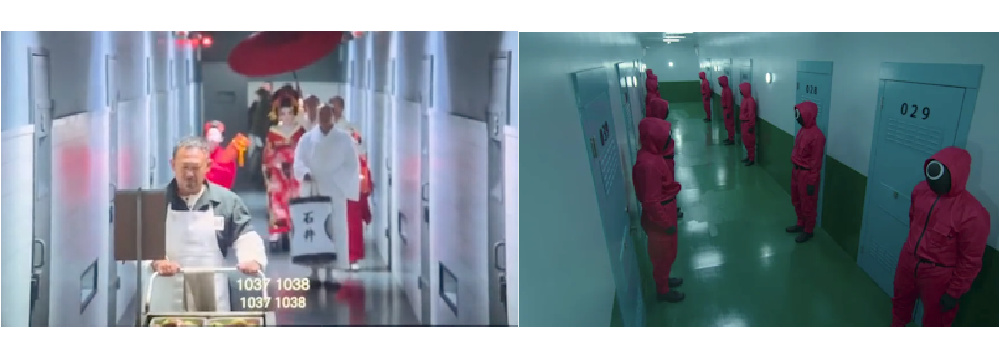
731 (left), Squid Game (right)
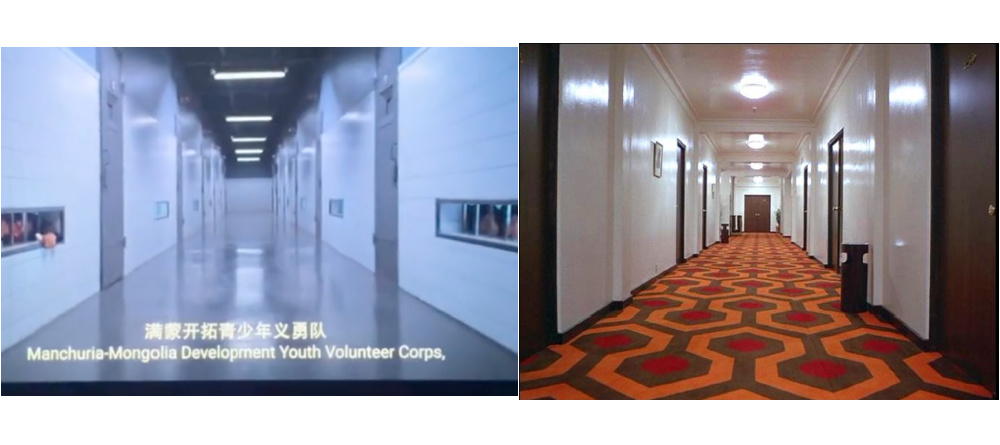
Scene from 731, which I thought sometimes had some echoes from The Shining.

Another reference to Stanley Kubrick? 731 on the left, Clockwork Orange on the right.
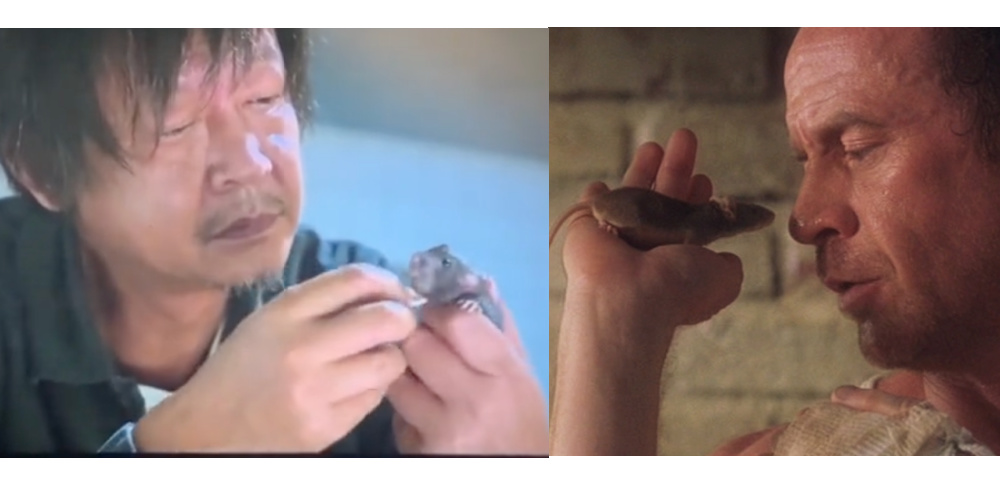
Prison mouse friend. 731 (left) and The Green Mile (right).
And that is also what most of the online critique is about – people feel that while the movie is supposed to be about creating awareness of a particularly horrific part of Chinese war history, the actual factual history seems to have ended up in the background.
One commenter from Harbin wrote:[5]
💬 “For Harbin, 731 is the most painful chapter of history. This movie uses a mass of absurd visuals and music to tell a story that has almost nothing to do with real history. All the information that truly should have been shown is brushed over in passing words, and in the end it just tells audiences ‘never forget history’? This tramples on the history of 731. Stupid and vulgar.”
Others are also upset over historical inaccuracies in the film — from the makeup to the sets, the props, and the biological experiments. Even the toilet paper used by the prisoners isn’t very realistic, with some commenters saying these kinds of details ‘drove them crazy’:
💬 “I’m born after 1990, and even I grew up with worse toilet paper than what the aggressors in those years apparently gave to their prisoners. Theirs was so high-quality you could fold it into bows and baby shoes. Must have been strong, durable, and waterproof.”[6]
One other reviewer on Douban wrote:
💬 “As a prison break film it’s not exciting, as a historical film it’s too careless, and as a drama it’s too fragmented.”[7]
Douban reviewer Qingyun (青云) noted that it jumps from relatively calm scenes to intense emotional outbursts or extreme cruelty without any buildup — instead of moving viewers to tears, it alienates them from the story and its characters.
He adds:
💬 “The film wants to exploit history’s seriousness to entertain the public, but also fears the theme is too depressing and will affect the box office, so it stuffs in commercial gimmicks (jokes, fantasy, spectacle). This opportunism sacrifices the solemnity that is rewired for the historical topic, while also failing to provide as qualified entertainment. The result: it offends history and disappoints audiences.”[8]
Most of these disappointed reviewers argued that the chance to tell the story of Unit 731 was wasted by a director and script that offered little context to the subject, with some even suggesting that another, 37-year-old film (Men Behind the Sun, 黑太阳731, 1988) did a better job of conveying the history of Japan’s biological warfare in China.
A ‘Masterful Cult Film,’ But a ‘Total Failure’ as a War Movie
Despite the wave of strongly negative feedback, there are also those who did find the film moving, giving it five-star reviews — some from those who stress the film’s value as a reminder to “never forget national humiliation,” while others genuinely appreciate its creative vision.
Douban commenter ‘Bat Lord’ (蝙蝠君) called it a “masterful cult film” with the film’s aesthetics being “built on a foundation of Western stereotypical Orientalism of Japan and layered with Christian martyrdom.”[9]
As an example, Bat Lord describes a recurring scene in which prisoners are taken from their cells toward “freedom,” only to be taken to lethal human experiments. They are escorted by Japanese guards in traditional kimonos with samurai swords, led by a geisha carrying a bright red umbrella and wearing impossibly high okobo clogs, followed by Edo-period guards with topknots and white kimono. Bat Lord calls it “Orientalist punk seen through a Western gaze” (“有一种西方视角的东方主义朋克的味道”).
The reviewer also interprets the main characters, the Chinese prisoners, as representations of Christian martyrdom. Cross symbols are indeed everywhere in the film, with prisoner No. 017 constantly drawing crosses on the wall, and an ingenious escape plan hidden in a dictionary as a series of crosses.
At the climax, after battling guards in kimonos with wooden swords, the prisoners flee toward a crematorium resembling a cathedral of light, where crosses formed from pure white beams symbolize freedom. But behind the cross loom the Japanese executioners. After a bloody massacre, the survivors are captured and executed — tied to crosses arranged around a pit, with fleas dropped on them from above as Japanese officers watch from a grandstand.
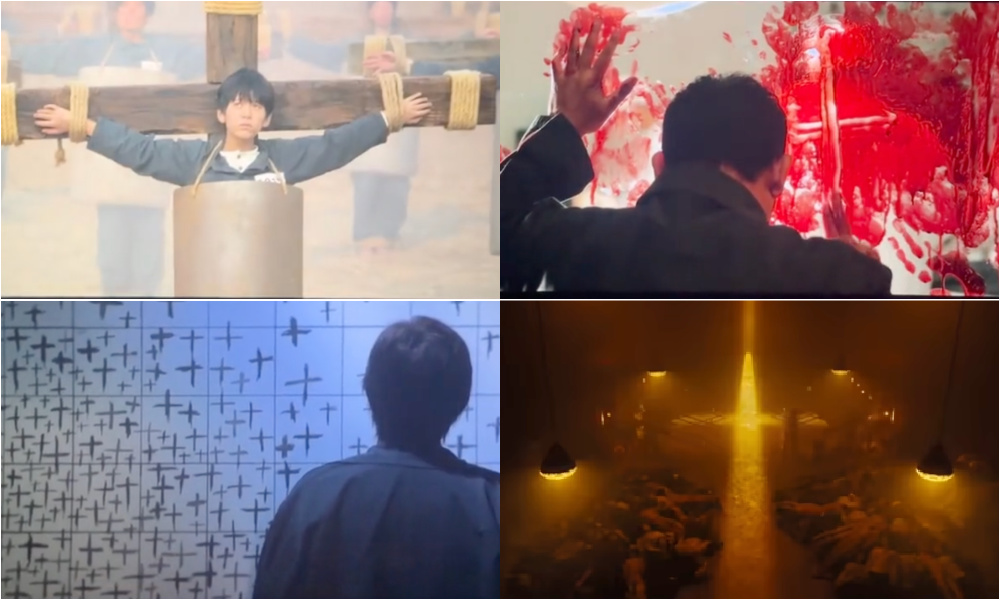
Cross symbols appear throughout the film.
💬 “It’s clearly a direct homage to Christian martyrs who were sacrificed in the Colosseum during the ancient Roman Empire. In the end, all the protagonists die martyrs’ deaths,” Bat Lord writes.[10]
He concludes that the film is “4/5 as an art house film, but zero points as a war movie”:
💬 “As a mainstream patriotic commercial blockbuster, it is a complete and utter failure (..) But as a niche cult prank film, it actually has some positive points (…) – built on exaggerated Orientalist visions of Japan, it feels strangely authentic. This kind of deconstruction of Japanese culture isn’t something the Japanese themselves could do — only the West or China, as seen in works like The Last Samurai, Ghost of Tsushima, and Shogun.” [11]
He adds:
💬 “The biggest problem is the subject matter. Using 731 — such a solemn, tragic history — only to hollow out its pain, exploit national emotions, and repackage it as a cult prank film disguised as a patriotic blockbuster, inevitably backfires. If it had been framed as a semi-fictional low-budget black comedy, the backlash wouldn’t be so severe.”[12]
“No Japanese in Heaven”: Over-‘Othering’ the Enemy
How could 731 have failed so miserably to live up to public expectations?
In recent years, Chinese museums, books, and popular culture have made many attempts to revitalize the history of war and make it more relevant to younger generations. In many cases, this has been successful, from popular war dramas to blockbuster films.
But Unit 731 is perhaps an especially difficult subject to adapt into a commercially successful film for a broad audience, especially since it chose to leave out the kind of contextualization that Oppenheimer provided in exploring the history, process, and character development that led to the atomic bomb.
Like the gas chambers of Auschwitz or Mengele’s brutal experiments, its history is so gruesome that there is little to focus on beyond the suffering of the victims and the cruelty of the perpetrators. (The film had already been postponed once, as it allegedly failed to pass official screenings due to its graphic scenes.)
War films in China are expected to reflect — or help shape — national identity. In 731, this means boosting national unity by focusing on Japan as the ultimate “Other,” the ‘constructed outsider’ against which the own national identity is defined.
The entire nation is cast as an enemy, depicted through exaggerated cultural symbols — geishas, kimonos, samurai, and cherry blossoms — regardless of whether they belonged in the actual prison setting. Japan’s national colors and imagery are fused with scenes of bloody and barbaric slaughter, turning Japanese cultural identity itself into a target.
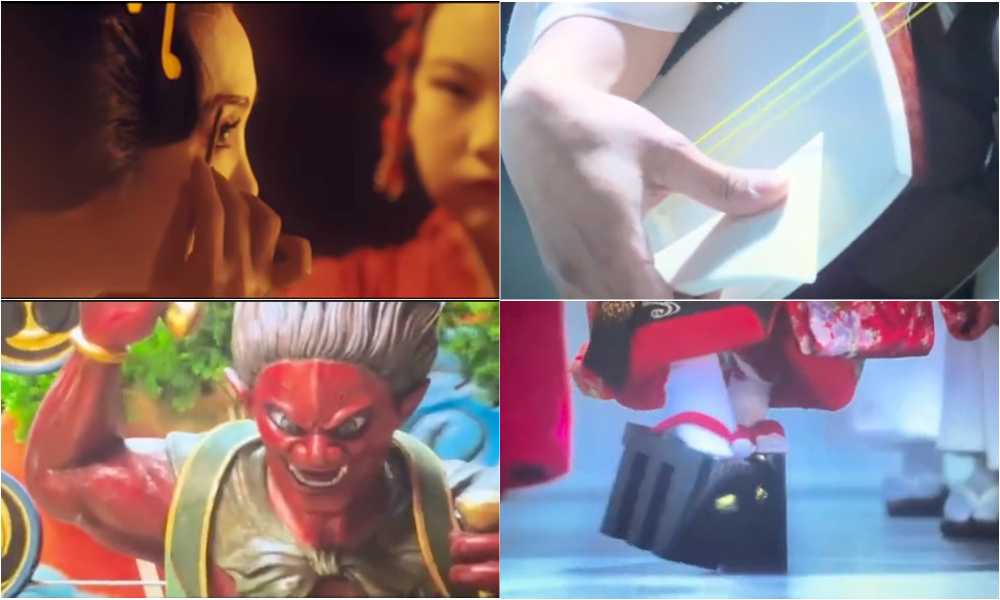
References to Japanese cultural symbols in the film.
In doing so, the film not only holds Japan as a whole responsible for its wartime aggression, but also strengthens Chinese identity by defining it in opposition to Japan, visually contrasting “good” versus “evil” through opposing characters, colors, and symbols.
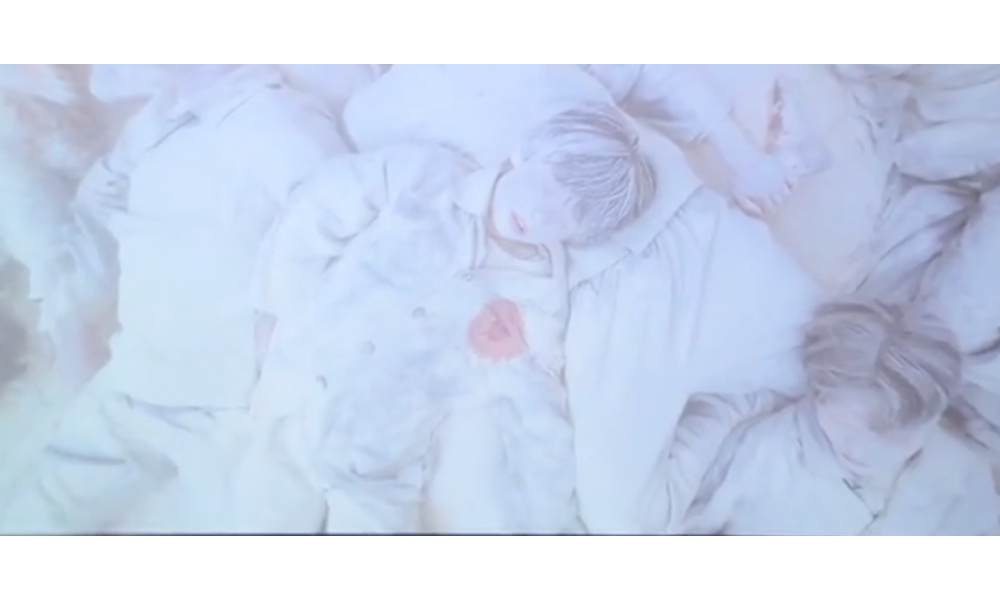
Clear visual symbols: dead Chinese bodies covered in white dust. With the red circle of blood, the scene resembles a Japanese flag.
This contrast is also made explicit in dialogue: at the beginning of the film, for instance, a young boy enters the stark white prison halls and asks, “Master, are we in heaven?” to which the older Chinese man replies, “Nonsense, how could there be Japanese in heaven?”
In promoting the film, director Zhao Linshan (赵林山) reinforced the image of Japan as the eternal “Other” by explaining that he had insisted none of the Japanese roles could have possibly played by Chinese actors, suggesting they would not be able to convey their evilness. Despite the difficulty of bringing over more than 80 Japanese actors during China’s ‘zero Covid’ era, when 731 was largely filmed, Zhao maintained that “only the Japanese can play this dual nature.”
While Chinese social media is often filled with anti-Japanese sentiment, many viewers criticized the depiction of “Japan” and the Unit 731 staff — not because of the anti-Japanese angle, but because they felt it trivialized history. They argued that Unit 731 was already so horrific that it needed no added gimmicks, tropes, or exaggerated villains to make it look bad.
As Douban reviewer Qingyun wrote:
💬 “Portraying devils as clowns diminishes their true guilt. The real criminals were rational, organized, and intelligent, embodying the will of Japanese militarism as a systematic project. Making them idiots (..) greatly underestimates the danger and organization of militarism, and is a severe simplification of history.”[13]
This critique goes further, suggesting the film both weakens its warning value (“the true terror is that advanced civilization and barbarism can coexist”) and cheapens the victims’ suffering (“if the enemy is so stupid, the tragedy seems less grave”).
On Weibo, one commenter criticized this one-sided approach:
💬 “I saw an auntie in Hangzhou who, after watching the movie 731, said she hated the Japanese devils so much — that she would hate them for her entire life. But this elderly woman, brainwashed by hatred education for a lifetime, doesn’t stop to think that (..) so many other brutal slaughters happened throughout Chinese history. If you only speak of hate, can your hate keep up with all of them? Shouldn’t we instead explore and reflect more deeply on the underlying causes of these events? Better to talk less of hate and more of love — because only the most genuine love from the depths of the human heart can ultimately prevent such tragedies from happening again.”[14]
Some viewers who appreciated the film, however, disagreed. One Weibo user wrote: “I watched the film with my husband and on our way home we scolded the Japanese, wishing we could throw two more atomic bombs on them. It was a good film.”
Between the history and the hate, the official narrative, the polarized audience reactions, and disagreements over the film’s message, 731 has brought more controversy than clarity.
But beyond the debate and confusion, one message remains clear. As one viewer wrote:
“The film wasn’t what I expected, but I’m not sure what I even expected? A good story? More like a documentary? There’s one thing I can say for sure: this movie is just a shell — the history itself is the soul.”[15]
By Manya Koetse
Spotted a mistake or want to add something? Please let us know in comments below or email us. First-time commenters, please be patient – we will have to manually approve your comment before it appears.
References
- “看完有种被诈骗的感觉” (source: Douban).
- “一句话评价《731》,导演按照《肖申克的救赎》拍出了《鱿鱼游戏》” (source: Xiaohongshu).
- “令人非常迷惑” (source: Douban).
- “短评骂的字数不够了实在是忍不了了” (source: Douban).
- “作为一个哈尔滨人,去过至少三次纪念馆,731对于哈尔滨就是最沉痛的一段历史,这个电影用大量极其荒诞的镜头和音乐,讲述一个基本跟真实历史毫无关系的故事,所有真正需要拍出来的信息全部是文字一笔带过,最后却告诉观众勿忘历史?这是对731这段历史的践踏。弱智且下流” (Source: comment section Sina).
- “作为一个90后,我出生的那个年代卫生纸质量都达不到侵略者给实验体使用的,纸的质量太好了,又是编蝴蝶结,又是编鞋子的,我猜应该是坚韧又耐用,透水都不断的那种吧” (Source: Douban long reviews).
- “或许是删减太多或许是各种局限,当做越狱不精彩,当做历史片太随意,当做剧情片太碎片”(Source: Douban).
- “影片既想利用沉重历史的严肃性作为宣传噱头,又担心题材过于压抑影响票房,于是强行注入商业娱乐元素(搞笑、幻想、刺激场面)。这种“既要…又要…”的投机心态导致影片既失去了历史题材必需的敬畏感,又未能提供合格的娱乐体验。最终,它既冒犯了历史,也辜负了观众”(Source Douban, review by Qingyun (青云).
- “西方刻板印象东方主义日本与基督殉难的碰撞,cult片的杰出之作”(Source: Douban, review by ‘Bat Lord’ (蝙蝠君).
- “很明显也在致敬古罗马帝国时期殉道在斗兽场的圣徒们。最终主角团全员殉道,无一幸免。”
- “这个片作为主流主旋律商业大片是完全的,彻头彻尾的失败,彷佛那纯纯的依托!甚至从预告片开始这电影就没有任何一丝一毫的符合历史,我从一开始就完全没有抱任何期望的去看,结果发现这片作为小众邪典整蛊片却颇有可取之处(。。)当你不认为这片是正常电影之后,这片表达出的那股子真的是超正宗的外国视角下的刻板印象东方主义日本美学、东方朋克味,这种对日本文化的魔怔向的解构其实我个人还真感觉挺不错的。这种解构日本人是搞不出来的,目前只有欧美和中国能搞出来,代表作就是《最后的武士》、《对马岛》、《幕府将军》之类的作品,里面的日本文化,日本武士道精神一个赛一个魔怔,欧美是往骑士幻想的那个路子去走的,我们是往黑暗邪典的路子去走的“
- “所以这片的最大问题还是选择了731这个严肃题材,完全在消解历史的悲痛,消费民族的情感,拍了个小众邪典整蛊片后,还按照主流商业片来包装和宣发,如果他拍成半架空的超小成本黑色喜剧我觉得反噬恐怕不会有这么大”(Source: Douban).
- “它美化了真正的邪恶:将恶魔塑造成小丑,实际上减轻了他们的罪责。真实的731部队不是一群疯癫的傻瓜,而是清醒的、有组织的、高智商的罪犯。他们的行为是日本军国主义国家意志的体现,是一个系统性的工程。把他们拍得弱智,仿佛这场悲剧只是一群笨蛋造成的意外,这极大地低估了军国主义的危害性和组织性,是对历史的严重简化”(source: Douban).
- “看到一位杭州阿姨看完电影731后讲太恨日本鬼子了,要一辈子一辈子的恨。这个被仇恨教育洗脑一辈子的老太太,您也不思考一下,嘉定三屠,江东六十四屯,南京大屠杀等等一系列的野蛮屠杀事件在中国历史上发生的太多了,光讲恨您恨的过来吗?不应该是更多的探究和反省发生这些事的深层原因嘛!还是少谈恨多讲爱吧,只有发自心底人类最真实的爱才能最后解决这些惨案在人类世界的发生吧”(Source: Weibo).
- Weibo user “红屋顶上的猫”: “我不知道该怎么评。首先在这个忙乱的日子里安排自己去看这个电影,我也说不清楚我是想铭记那段历史,还是想比较小时候看过的《荒原城堡731》,还有那部《黑太阳》。其次我也不知道电影从越狱视角切入,写实和魔幻风格交替,是好还是不好?但它和我想象的不一样,可我也不知道自己想看到的到底是什么样?甚至我也说不清我对这场电影的期待是什么?讲好故事?还是拍成纪录片?我只能确定,电影只是个壳子,那段历史才是灵魂。”
©2025 Whatsonweibo. All rights reserved. Do not reproduce our content without permission – you can contact us at info@whatsonweibo.com.
Subscribe
Eye on Digital China is a reader-supported publication by
Manya Koetse (@manyapan) and powered by What’s on Weibo.
It offers independent analysis of China’s online culture, media, and social trends.
To receive the newsletter and support this work, consider
becoming a paid subscriber.

Get in touch
Have a tip, story lead, or book recommendation? Interested in contributing? For ideas, suggestions, or just a quick hello, reach out here.

Signals: Hasan Piker’s China Trip & the Unexpected Journey of a Chinese School Uniform to Angola

About Eye on Digital China — Powered by What’s on Weibo

China Trend Watch: Japan Tensions, Nexperia Fallout, Yunnan’s ‘Wild Child,’ & “Modern Opium”

Eye on Digital China: How Chinese Social Media Evolved from the Blog Era to the AI-driven Age

Trump and Takaichi: The Unexpected Love Affair

The Wong Kar-wai Scandal Explained: The Dark Side of ‘Blossoms Shanghai’

From Schadenfreude to Sympathy: Chinese Online Reactions to Charlie Kirk Shooting

From Nobel Farewell to ‘VIP Toilets’: What’s Trending in China

From Tents to ‘Tangping Travel”: New Travel Trends among Young Chinese

China’s “Post Parade Afterglow”: 6 Social Media Trends
Popular Reads
-

 China Memes & Viral5 months ago
China Memes & Viral5 months agoHidden Cameras and Taboo Topics: The Many Layers of the “Nanjing Sister Hong” Scandal
-

 China Insight7 months ago
China Insight7 months agoUnderstanding the Dr. Xiao Medical Scandal
-

 China Memes & Viral11 months ago
China Memes & Viral11 months agoOur Picks: Top 10 Chinese Buzzwords and Phrases of 2024 Explained
-

 China Digital10 months ago
China Digital10 months ago“Dear Li Hua”: The TikTok/Xiaohongshu Honeymoon Explained




Cat Lost
December 16, 2021 at 10:16 pm
Tears streaming down my face while reading your article. Thank you! Thank you!! Finally some unbiased news report on Zhang Zhehan.
Sônia Maria Frazão Ramires
December 17, 2021 at 1:52 am
👏🏻👏🏻👏🏻👏🏻👏🏻👏🏻👏🏻👏🏻👏🏻👏🏻👏🏻👏🏻👏🏻👏🏻👏🏻👏🏻👏🏻👏🏻👏🏻👏🏻👏🏻👏🏻
Bing
December 17, 2021 at 5:31 pm
Thank you very much for writing this, I really appreciate this well-sourced, and well-written article.. thank you..
Max
December 17, 2021 at 6:37 pm
Thank you for writing this article from a well-balanced view and using actual sources. It’s much appreciated!
JaneDrew
December 17, 2021 at 7:39 pm
Thank you for this well-researched look at this case, including the information about the level of cyber-bullying and misinformation involved! The extent to which a person’s life and reputation can be attacked by malicious actors is really upsetting. The extent to which a lot of reporting about Zhang Zhehan claims that he did go to the shrine or that he was “banned by the government” is also unfortunate, and I’m glad that the author took the time to actually do research and provide accurate information.
Nao
December 18, 2021 at 5:10 am
Great article! Thank you
LT
December 20, 2021 at 1:16 pm
Thank you for the update,I just recently came across this actor and felt very sorry to what has happen to him. Love his work and his personality,it really hurt reading how he broke down and cry.
It is very unfair to be judge before being able to defend oneself.And hence why the need to have a balance of power politically(well my view).
I really hope things will turn around quickly for him.A miracle is needed. Someone needs to be held accountable sharing all those fake news about him. By then his name will clear and he will be off the hook. And I hope really soon.
Joe
December 20, 2021 at 6:48 pm
Appreciate basing the article on sources and realize this is a opinion piece, can’t help but feel there is an overly biased tone though? (especially the cherry blossoms part which conveniently glosses over that the shrine is a site commemorating war crimes in favour of statistics which show that “Other Chinese people go there too!”) Imo the article will be much better without attempting to downplay the implications a public figure can cause when one poses in front of such a monument.
San
December 21, 2021 at 10:30 pm
Thank you for the article!! It’s Christmas. If Santa is real, I wish for Zhang Zhehan’s well-being and a comeback. we need a miracle for this to happen soon. We can only wish I guess. I cannot imagine how helpless they must be feeling right now.
Sarah
December 26, 2021 at 3:04 am
To Joe: Please note the article clearly states that the shrine commemorates war crimes. Specifically:
“The Yasukuni Shrine in Tokyo is notorious for enshrining “1,068 convicted war criminals, 14 of whom are A-Class (convicted of having been involved in the planning, preparation, initiation, or waging of the war).” The shrine is of great significance when it comes to Sino-Japanese history, as many of Japan’s war dead enshrined at Yasukuni committed atrocities against the Chinese, including during the ‘Nanjing Massacre‘ which started in December 1937 and came to be known as the most notorious Japanese atrocity of the Second Sino-Japanese War.
This is a sensitive topic and it is best to read the article before making baseless allegations.
meeeena
December 30, 2021 at 8:11 am
Thank you so much for all your hard work!
I really hope Zhang Zhehan is doing well and can make an awesome comeback SOON!
Youn ji young
January 20, 2022 at 6:38 am
당신이 바로 제시카 이군요! 고맙고 반가워요. 계속해서 Zzh 을 위해 애써주시기 바랍니다
법적인 절차가 진행 된다는 좋은소식을 기다립니다! 24일이면 신고한지 한달이지나는건데, 아직 소식이없어서 초조합니다
💚🇰🇷
María
January 20, 2022 at 8:09 pm
#GoLiXuezheng #IsupportZZH #bestrongZZH
Ti
February 12, 2022 at 11:51 am
1. Mr. Li Xuezheng interviewed ZZH in Jan 2022, in which he stated that he is willing to be investigated on whether he visited that controversial shrine. He was following a tour to view cherry blossom.
The interview with English subtitle on youtube:
https://youtu.be/bUt1raMMJBY
It is worth noting that many folks have raised their voice now that though all were taught about the controversial shrine, but most citizens don’t know the exact location. And that was probably the point where the cyber violence took advantage of.
There were clarifications showing that the building seen behind ZZH in the picture is the (cherry blossom) park management building, not the shrine.
At this point, it seems the justice is in the hands of the police now. It is rather strange that without thorough investigation, CAPA issued the boycott on ZZH within hours of the spreading of the accused fake news on Aug 13, 2021.
It is more questionable that they did jt again in in Nov 2021, after many clarifications came out about how the building behind ZZH was not the shrine. We would think a full investigation should have performed by then, before such a severe punishment is done on a citizen.
And then within 10 days, ZZH himself appeal to CAPA as they indicated, but all he received was a piece of paper with a phone number that would go straight to voice mail.
This ordeal with CAPA is very fishy, and the timing of ZZH old picture being made a hot topic is too much of a coincident. Probably this is the unruly entertainment industry behavior that the government is trying to fix.
2. Later on, Mr. Li was asked by his upper manager to delete all his posts questioning CAPA. He asked if that directive was from the party. But it was from some leader in the organization.
Several days later, rumors were spread on the net that Mr. Li himself has visited the controversial shrine.
I think at this point it is very clear that there was a force behind the scene running those rumors and misinformation.
A few days later, Mr. Li was muted too.
Details can be reviewed here:
https://youtu.be/bUt1raMMJBY
3. Using trolls and disinformation to defame someone is not new. There’s a TedEd video about it, which you will find having similar tactics as what were done to ZZH, and probably Mr.Li now too.
https://fb.watch/b7iuw4l6DI/
4. In the interview with Mr. Li Xuezheng, Zhehan mentioned that he himself has tried to report his case to the police, of misinformation and defamation, but many police departments didn’t accept his case, due to strong public opinion. Around late December, Beijing police department accepted his report.
A few days later, there was a directive that ensure all police departments must accept any case reports from citizen.
I think that was a good news, that the government noticed. Any citizen should have their civilian right, and should be considered innocent until proven guilty.
Khal
February 21, 2022 at 11:01 am
Hope ZZH get back to his normal life and the Govt of China to start looking into this seriously. I learn a lot abt the Chinese history while watching ZZH drama. You can see his loyalty to China and this is how they pay him.
Arini
February 25, 2022 at 7:47 am
Thank you for this clear information. I am his fan from Indonesia. The news makes me shock, but I’m glad that his movies are still on iQIYI.
You got my support Zang Zhe Han! (And maybe from all of your fans in Indonesia) Hope your star rising more after this!
Anthea Philander
March 10, 2022 at 10:09 am
God bless you Zhang Zhehan. Cannot wait for your name to be cleared and the real perpetrators punished‼️ Cyber bulling and cancel culture at its worse. Remember: clean hands needs no washing – the truth will eventually come out…So hang in there and stay strong 💖💞❤️💗💕
TI
March 12, 2022 at 11:04 am
Just like this article said, Zhang Zhehan is still paying an unimaginable price for a crime he didn’t commit.
Here is the first and only interview he had after the attacks in Aug 2021, with Mr. Li Xuezheng:
https://youtu.be/G_okUh4H9cI
Recently, his mother has posted another letter to her tea shop WeChat account about how she dare not grow old, as she needs to be strong for her son. Her son has been unemployed since Aug 2021, they dared not go out at first, even contemplated suicide to prove their innocent, but then decided that staying alive is only chance they have to clear their names. She has been providing for them both, on top of paying the debt caused by the cancelation of those endorsements.
https://youtu.be/-rNt6bBEsrU
okj
April 21, 2022 at 11:05 am
Quite obvious that this is a coordinated effort by regime change agents to manipulate discord among Chinese netizens by manufacturing the traitor card against a patriotic actor and his family to create civil unrest via the c-entertainment realm. Those responsible are following the playbook as outlined in the documentary ‘The Social Dilemma’ https://consortiumnews.com/2021/01/14/netflixs-the-social-dilemma-tells-only-half-the-story/